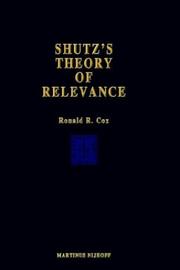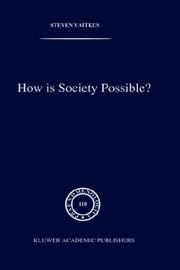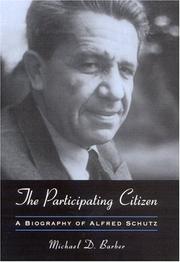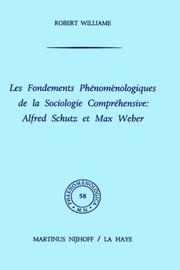| Listing 1 - 8 of 8 |
Sort by
|
Book
ISBN: 9783030951467 3030951464 9783030951474 Year: 2022 Publisher: Cham Springer
Abstract | Keywords | Export | Availability | Bookmark
 Loading...
Loading...Choose an application
- Reference Manager
- EndNote
- RefWorks (Direct export to RefWorks)
Appräsentation gehört zu den Schlüsselkonzepten im Werk des Philosophen und Begründers der Phänomenologie Edmund Husserl (1859–1938) und des ihm nachfolgenden Alfred Schütz (1899–1959). In dem Buch bringt der Autor die Ergebnisse ihrer lebenswelttheoretischen Forschung zusammen und systematisiert ihre Überlegungen zur Appräsentation – dem Mitgegebensein von etwas, das eigentlich nicht da ist. Dies nimmt er zum Ausgangspunkt, um sich mit der kulturphilosophischen These auseinanderzusetzen, nach der menschliche Erfahrung kulturell geprägt ist. Das Erklärungspotenzial der transzendentalphänomenologischen Tradition Husserls und der mundanphänomenologischen Tradition von Schütz demonstriert der Autor an zwei Beispielen aus der Kulturphilosophie und der Kultursoziologie. Was leistet also das Konzept der Appräsentation im Detail und wie kann es helfen kulturelle Sinnkonstitution zu beschreiben? Um diese Frage zu beantworten, wird im ersten Teil des Werks zunächst die Phänomenologie an die Logik der Kulturwissenschaften angeknüpft, um dann die Bedeutung appräsentativer Beziehungen bei Husserl zu klären – beispielsweise für das Bewusstsein von Zeit, der Horizontstruktur von Erfahrungen oder Einfühlung. Im nächsten Schritt legt der Autor den Stellenwert von Appräsentationsbeziehungen im Werk von Schütz offen. Er fragt nach ihren Dimensionen, wie sie in Schütz‘ weit ausdifferenzierten Symbol- und Zeichentheorie zum Ausdruck kommt, anhand derer er Kulturalität und Sozialität phänomenologisch beschreibt. Die Analyse bringt zweierlei hervor: die Bedeutung des appräsentativen Mitdaseins von Erfahrungsaspekten und die komplexe appräsentative Relation von unterschiedlichen Sinnschemata als Grundelement kultureller Sinnsetzung. Diese erste Monographie zum Thema der Appräsentation und der appräsentativen Beziehungen erscheint in der Buchreihe Phaenomenologica. Das Werk richtet sich an Studierende und Forschende aus den Geistes- und Sozialwissenschaften mit Interesse an Phänomenologie, soziologischer Theorie oder Kulturphilosophie.
Husserl, Edmund, --- Schutz, Alfred, --- Academic collection --- Husserl, Edmund --- Schutz, Alfred --- Philosophy and psychology of culture --- Theory of knowledge --- Culture --- Phenomenology

ISBN: 9024720419 9789024720415 9400996977 9400996950 Year: 1978 Volume: 77 Publisher: The Hague Nijhoff
Abstract | Keywords | Export | Availability | Bookmark
 Loading...
Loading...Choose an application
- Reference Manager
- EndNote
- RefWorks (Direct export to RefWorks)
Sociological theory building --- Theory of knowledge --- Relevance (Philosophy) --- Phenomenology --- Pertinence (Logique) --- Phénoménologie --- Schütz, Alfred, --- Husserl, Edmund, --- Schutz, Alfred, --- Academic collection --- Philosophy --- Philosophy, Modern --- Schutz, Alfred --- Husserl, Edmund --- Phenomenology. --- Phénoménologie. --- Sciences sociales. --- Pertinence (logique). --- Phänomenologie. --- Schutz, Alfred. --- Critique et interprétation. --- Relevance (Philosophy). --- Pertinence (Logique). --- Phénoménologie --- Schütz, Alfred, --- Husserl, Edmond --- Schütz, Alfred --- Schütz, Alfred, - 1899-1959 --- Husserl, Edmund, - 1859-1938
Book
ISBN: 3770522605 9783770522606 Year: 1985 Volume: 4 Publisher: München Fink
Abstract | Keywords | Export | Availability | Bookmark
 Loading...
Loading...Choose an application
- Reference Manager
- EndNote
- RefWorks (Direct export to RefWorks)
Phenomenology --- Schutz, Alfred, --- Gurwitsch, Aron --- Husserl, Edmund, --- Correspondence --- 316 --- #SBIB:316.20H14 --- Philosophy, Modern --- Sociologie --(algemeen) --- Grondleggers van de sociologie: Duitsland --- -Husserl, Edmund --- Schutz, Alfred --- -Correspondence --- 316 Sociologie --(algemeen) --- Husserl, Edmond --- Husserl, Edmund --- Correspondence. --- Schütz, Alfred --- Schutz, Alfred, - 1899-1959 - Correspondence --- Gurwitsch, Aron - Correspondence --- Husserl, Edmund, - 1859-1938 --- Schutz, Alfred, - 1899-1959
Book
ISBN: 0826272398 9780826272393 082621911X 9780826219114 9780826219114 082621911X Year: 2011 Publisher: Columbia University of Missouri press
Abstract | Keywords | Export | Availability | Bookmark
 Loading...
Loading...Choose an application
- Reference Manager
- EndNote
- RefWorks (Direct export to RefWorks)
Scholarly correspondence can be as insightful as scholarly work itself, as it often documents the motivating forces of its writers' intellectual ideas while illuminating their lives more clearly. The more complex the authors' scholarly works and the more troubled the eras in which they lived, the more substantial, and potentially fascinating, their correspondence. This is especially true of the letters between Alfred Schutz (1899-1959) and Eric Voegelin (1901-1985). The scholars lived in incredibly dramatic times and produced profound, complex works that continue to confound academics. The communication between these two giants of the social sciences, as they sent their thoughts to one another, was crucial to the work of both men.
Sociologists --- Behavioral scientists --- Social scientists --- Voegelin, Eric, --- Schutz, Alfred, --- Schütz, Alfred --- Voegelin, Erich,

ISBN: 0792308204 9401074321 9400920776 9780792308201 Year: 1991 Volume: 118 Publisher: Dordrecht Kluwer
Abstract | Keywords | Export | Availability | Bookmark
 Loading...
Loading...Choose an application
- Reference Manager
- EndNote
- RefWorks (Direct export to RefWorks)
Fenomenologische sociologie --- Intersubjectiviteit --- Intersubjectivity --- Intersubjectivité --- Phenomenological sociology --- Phénoménologie et sociologie --- Phénoménologie sociologique --- Résonance intersubjective --- Sociological phenomenology --- Sociologie et phénoménologie --- Sociologie phénoménologique --- Sociology [Phenomenological ] --- Gurwitsch, Aron --- Schütz, Alfred, --- Phenomenological sociology. --- 316.2 MEAD, GEORGE HERBERT --- 316.2 SCHUTZ, ALFRED --- Sociology, Phenomenological --- Sociologische richtingen. Sociologische scholen. Sociologen--MEAD, GEORGE HERBERT --- Sociologische richtingen. Sociologische scholen. Sociologen--SCHUTZ, ALFRED --- Mead, George Herbert --- 316.2 SCHUTZ, ALFRED Sociologische richtingen. Sociologische scholen. Sociologen--SCHUTZ, ALFRED --- 316.2 MEAD, GEORGE HERBERT Sociologische richtingen. Sociologische scholen. Sociologen--MEAD, GEORGE HERBERT --- Intersubjectivité --- Sociologie phénoménologique --- Schütz, Alfred, --- Academic collection --- Ethnomethodology --- Phenomenology --- Sociology --- Ontology --- Social psychology --- Subjectivity --- Gurwitsch, Aron. --- Mead, George Herbert, --- Schutz, Alfred, --- Mead, G. H. --- Sociological theories --- Intersubjectivity. --- Mead, George Herbert, 1863-1931. --- Schutz, Alfred, 1899-1959. --- Schütz, Alfred --- Phénoménologie --- Phénoménologie --- Intersubjectivite

ISBN: 0791484785 1423740203 9781423740209 0791461416 9780791461419 9780791484784 Year: 2004 Publisher: Albany State University of New York Press
Abstract | Keywords | Export | Availability | Bookmark
 Loading...
Loading...Choose an application
- Reference Manager
- EndNote
- RefWorks (Direct export to RefWorks)
An in-depth biography of the philosopher who brought phenomenology to the social sciences.
Phenomenological sociology. --- Sociologists --- Sociological phenomenology --- Sociology, Phenomenological --- Ethnomethodology --- Phenomenology --- Sociology --- Behavioral scientists --- Social scientists --- Schutz, Alfred, --- Schütz, Alfred --- Phenomenological sociology

ISBN: 9024715318 9789024715312 Year: 1973 Volume: 58 Publisher: La Haye Nijhoff
Abstract | Keywords | Export | Availability | Bookmark
 Loading...
Loading...Choose an application
- Reference Manager
- EndNote
- RefWorks (Direct export to RefWorks)
This is an unusual volume. During his periods of study with Ed mund Husserl - first from I924 1. 0 I926, then from I93I to I932 - Dorion Cairns had become imnlensely impressed with the stri king philosophical quality of Husserl's conversations with his students and co-workers. Not unlike his daily writing (five to six hours a day was not uncommon, as Husserl reports herein, the nature of which was a continuous searching, reassessing, modi fying, advancing and even rejecting of former views), Husserl's conversations, especially evidenced from Cairns's record, were remarkable for their depth and probing character. Because of this, and because of the importaIlt light they threw on Husserl's written and published works, Cairns had early resolved to set down in writing, as accurately as possible, the details of these conversations. Largely prompted by the questions and concerns of his students, including Cairns, the present Conversations (from the second period, I93I-I932, except for the initial conversation) provide a significant, intriguing, and always fascinating insight into both the issues which were prominent to Husserl at this time, and the way he had come to view the systematic and historical placement of his own earlier studies. Cairns had often insisted - principally in his remarkable lec 1 tures at the Graduate Faculty of the New School - that attaining a fair and accurate view of Husserl's enormously rich and complex 1 Cairns's lectures between 1956 and 1964 are especially important.
Philosophers --- Philosophy --- Philosophes --- Philosophie --- Husserl, Edmund, --- Fink, Eugen --- --Pensée --- --1926-1931 --- --Husserl, Edmund, --- Phénoménologie --- --Philosophers --- -Philosophy --- Academic collection --- Mental philosophy --- Humanities --- Scholars --- Biography --- Schutz, Alfred --- Weber, Max --- Husserl, Edmund --- ウェーバー --- Philosophy. --- Sociology. --- Biography. --- Fink, Eugen. --- Schütz, Alfred --- Schütz, Alfred, --- 316.282 --- Handelingstheorie. Social action. Weber. Actionalisme. Actietheorie--(sociologische scholen) --- 316.282 Handelingstheorie. Social action. Weber. Actionalisme. Actietheorie--(sociologische scholen) --- Schütz, Alfred, --- Husserl, Edmond --- Sociology --- Sociologie --- Weber, Max, --- 316.277 --- Social theory --- Social sciences --- 316.277 Ethnomethodologie. Fenomenologische sociologie. Interactie. Symbolisme. Blumer. Schutz. Garfunkel--(sociologische scholen) --- Ethnomethodologie. Fenomenologische sociologie. Interactie. Symbolisme. Blumer. Schutz. Garfunkel--(sociologische scholen) --- Sociological theory building --- Schutz, Alfred, --- --316.277 --- Ma-kʻo-ssu Wei-po, --- Makesi Weibo, --- Pebŏ, --- Pebŏ, Maksŭ, --- Vēbā, Makkusu, --- Veber, Maks, --- Vemper, Max, --- Webŏ, Maksŭ, --- Wei-po, Ma-kʻo-ssu, --- Weibo, --- Weibo, Makesi, --- ובר, מאקס, --- ובר, מאכס --- ובר, מקס --- 韦伯, --- Schütz, Alfred, - 1899-1959 --- Weber, Max, - 1864-1920 --- Pensée --- Husserl, Edmund, 1859-1938 --- ウェーバー, マックス
Book
ISBN: 351807802X 9783518078020 Year: 1977 Volume: 202 Publisher: Frankfurt am Main Suhrkamp
Abstract | Keywords | Export | Availability | Bookmark
 Loading...
Loading...Choose an application
- Reference Manager
- EndNote
- RefWorks (Direct export to RefWorks)
Social sciences --- #SBIB:316.21H10 --- #SBIB:316.21H60 --- Methodology. --- Het functionalisme en systeemdenken in de theoretische sociologie --- Fenomenologische sociologie --- Schutz, Alfred, --- Parsons, Talcott, --- Parsŭnz, Tolkŭt, --- Parsons, Tolkott, --- Pāsonzu, Tarukotto, --- Schütz, Alfred --- Methodology
| Listing 1 - 8 of 8 |
Sort by
|

 Search
Search Feedback
Feedback About UniCat
About UniCat  Help
Help News
News